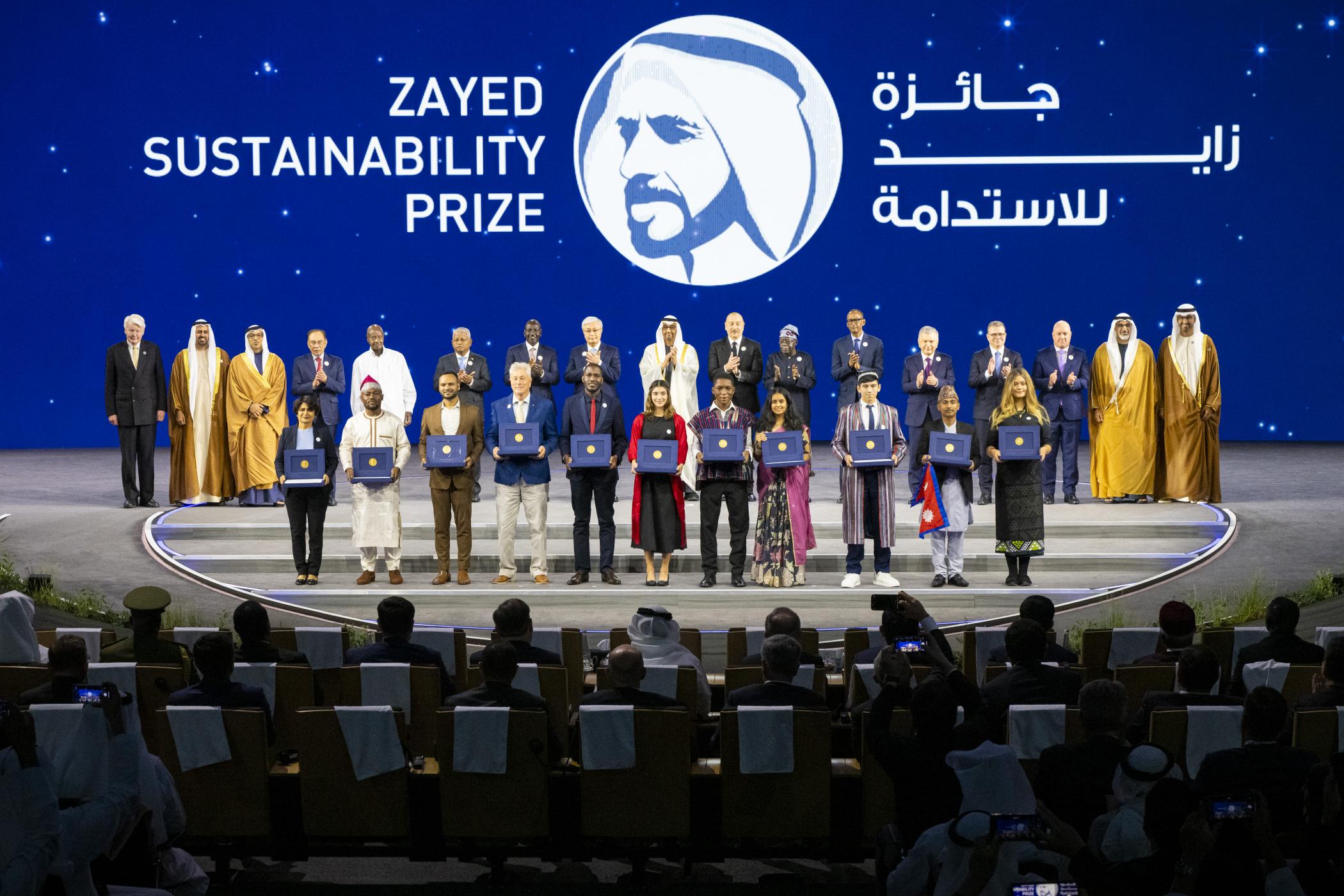Today, His Highness Sheikh Mohamed bin Zayed Al Nahyan, President of the UAE, recognised the 2025 winners of the Zayed Sustainability Prize. Celebrating the transformational impact of 11 pioneering organisations and high schools from across the world, the Prize reflects the UAE’s commitment to fostering scalable solutions to global challenges and empowering communities in their pursuit of sustainable prosperity.
In a Ceremony held during Abu Dhabi Sustainability Week (ADSW) and attended by 11 Heads of State, Ministers, and business leaders, H.H. Sheikh Mohamed bin Zayed awarded the winners for their remarkable achievements, encouraging continued innovation in every corner of the globe.
H.H. Sheikh Mohamed bin Zayed said: “The UAE remains steadfast in its commitment to fostering sustainable development and empowering communities across the world through innovation. The Zayed Sustainability Prize inspires impactful solutions that address critical social and environmental challenges. By nurturing these efforts, we are not only creating a more sustainable future for all, but also honouring the legacy of Sheikh Zayed, whose vision for global progress and humanitarianism continues to guide us.”
H.E. Dr. Sultan Ahmed Al Jaber, UAE Minister of Industry and Advanced Technology and Director General of the Zayed Sustainability Prize, lauded the incredible work being done to deliver innovative and scalable solutions that address the world’s most pressing challenges.
H.E. Dr. Sultan Ahmed Al Jaber said: “Today, we recognise a remarkable group of organisations and high schools that are driving tangible progress toward a more prosperous future. This year’s Prize winners showcase solutions that leverage advanced technologies, including AI, enhance local resilience, and deliver transformative, scalable impact worldwide. In doing so, they embody the power of progress in accelerating sustainable development and inclusive socio-economic growth.”
The 2025 Prize winners were elected by a distinguished panel of Jury members, across the six categories of Health, Food, Energy, Water, Climate Action and Global High Schools.
The Chair of the Jury and former President of the Republic of Iceland, H.E. Ólafur Ragnar Grímsson, said: “This year’s winners have showcased extraordinary innovation in addressing critical global challenges. They are tackling a huge range of problems, focused on reducing the damage from climate change and building more sustainable access to healthcare, energy, food and water, especially in underserved communities. These winners have the potential to drive significant, scalable impact around the world. Their contributions will undoubtedly move us closer towards achieving crucial sustainable development goals.”
In the Health category, India’s Periwinkle Technologies was awarded the Prize for its portable, AI-enabled cervical cancer screening device. Operating independently of electricity, the device is accessible even in remote or underserved area. It provides results at the point of care within 30 seconds, enabling early detection and significantly improving women’s health outcomes, having already screened over 300,000 women across India.
In the Food category, Nigeria’s NaFarm Foods won for its innovative hybrid solar food dryers that prevent post-harvest losses, reducing both food wastage and carbon consumption. To-date, 80 dryers have been distributed across six Nigerian states, benefitting over 65,000 farmers and lowering carbon emissions by 50,000 metric tonnes annually, whilst simultaneously empowering over 18,000 women and youth through up-skilling programmes.
In the Energy category, Palki Motors, an SME from Bangladesh, was awarded the Prize for its locally manufactured, affordable, and lightweight electric vehicles, designed specifically for commercial drivers. Priced at an accessible US $4,990, these vehicles cater to the unique transportation needs of the region. Palki Motors also operates a network of solar powered battery swap stations, which has already benefitted over 23,000 people.
In the Water category, SkyJuice Foundation, an NPO from Australia, won for its low-cost, easy to use, gravity-powered, water treatment solution, which uses low-pressure membrane filters to provide clean drinking water without the need for chemicals, pumps, or external energy sources. Their SkyHydrant model provides clean, potable water to entire communities. Over 3 million people have already benefitted from their 9,000 installations across 74 countries, which have collectively produced 1 billion gallons of safe drinking water.
In the Climate Action category, OpenMap Development Tanzania won for its innovative mapping solutions, which merge community-driven data collection with advanced technologies such as drones, Geographic Information Systems (GIS) and remote sensing. To date, the NPO has benefitted 140,000 people, engaged over 1,000 youth in community health efforts, and created 100 jobs.
Finally, the Zayed Sustainability Prize provides unparalleled opportunities for the next generation of sustainability leaders through its Global High Schools category, empowering youth to drive critical progress in their communities. As of 2025, the Prize’s 56 Global High Schools winners have impacted the lives of over 56,599 students and 480,660 people across the globe.
The 2025 recipients of the Global High Schools awards are Centro de Estudios Tecnológicos del Mar 07 (Mexico) representing The Americas; Sakafia Islamic Senior High School (Ghana), representing Sub-Saharan Africa; Merryland International School (UAE), representing the Middle East & North Africa; Presidential School in Tashkent (Uzbekistan), representing Europe & Central Asia; Janamaitri Multiple Campus (Nepal), representing South Asia; and Te Pā o Rākaihautū (New Zealand), representing East Asia & Pacific.
From providing access to clean energy, nutritious food, and safe water, to improving healthcare and strengthening climate resilience, the 2025 winners’ efforts embody the Prize’s commitment to the power of progress and sustainable innovation.
-Ends-













